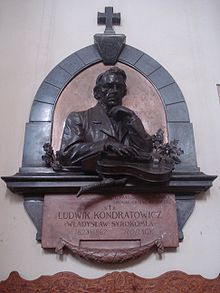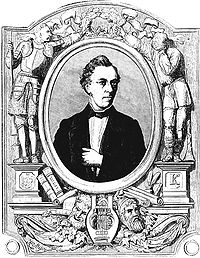Władysław Syrokomla: Difference between revisions
No edit summary Tag: references removed |
No edit summary Tag: references removed |
||
| Line 38: | Line 38: | ||
[[File:Syrokomla Wladyslaw pomnik w Sw Jana.JPG|thumb|Memorial of Władysław Syrokomla, in the Church of St. Johns, [[Vilnius]], [[Lithuania]]]] |
[[File:Syrokomla Wladyslaw pomnik w Sw Jana.JPG|thumb|Memorial of Władysław Syrokomla, in the Church of St. Johns, [[Vilnius]], [[Lithuania]]]] |
||
[[Image:Władysław Syrokomla.JPG|200px|right]] |
[[Image:Władysław Syrokomla.JPG|200px|right]] |
||
'''Vladislovas Sirokomlė''' was the pseudonym of '''Ludwik Władysław Franciszek Kondratowicz''' of [[Syrokomla Coat of Arms]] (1823–1862), was a |
'''Vladislovas Sirokomlė''' was the pseudonym of '''Ludwik Władysław Franciszek Kondratowicz''' of [[Syrokomla Coat of Arms]] (1823–1862), was a [[Poles|Polish]] romantic poet, writer and translator. |
||
==Biography== |
==Biography== |
||
Revision as of 10:22, 27 February 2011
Ludwik Kondratowicz | |
|---|---|
 Władysław Syrokomla by Adam Szemesz | |
| Resting place | Rasos Cemetery, Vilnius |
| Pen name | Władysław Syrokomla |
| Language | Polish |
| Nationality | Polish |
| Genre | Romanticism |
| Signature | |
 | |


Vladislovas Sirokomlė was the pseudonym of Ludwik Władysław Franciszek Kondratowicz of Syrokomla Coat of Arms (1823–1862), was a Polish romantic poet, writer and translator.
Biography
Syrokomla was born September 29, 1823 in the village of Smolhów, Imperial Russia (now Minsk Voblast, Belarus), to an impoverished szlachta family. His parents were Aleksander Kajetan and Wiktoria (née Złotkowska). Between 1833 and 1837 he attended the prestigious schools in Nesvizh and Navahrudak, but had to give up his studies due to financial problems. After that he started to work as a clerk in the Radziwiłł family lands manager's office. On April 16, 1844 in Niaśviž he married Paulina Mitraszewska, with whom he had four children.
In 1844 he published the first of his poems - Pocztylion - under the pen-name Władysław Syrokomla, coined after the coat of arms of his family. The same year he also rented a small village of Załucze. In 1853 he sold it and rented the village of Borejkowszczyzna, near Vilnius. There he became one of the authors of the Kurier Wileński, the biggest and the most prestigious daily newspaper published in the area of Vilnius. In his prose he supported the liberation of peasants and secession of the lands of former Polish-Lithuanian Commonwealth from the Imperial Russia that annexed them in the effect of the Partitions of Poland. For taking part in various anti-tsarist demonstrations in 1861 he was arrested by the Okhrana and then sentenced to home arrest in his manor in Borejkowszczyzna (now Bareikiškės). He died September 15, 1862. He was buried in the Rasos Cemetery in Vilnius. During burial ceremony, Edvardas Jokūbas Daukša emphasized, that while Syrokomla was influenced by Polish culture, he was Lithuanian poet, closest to Lithuania after Adam Mickiewicz.[1]
In Warsaw's residential district Bródno (city district Warszawa-Targówek) there are two streets dedicated to the poet: Ludwik Kondratowicz St and Władysław Syrokomla St.
Works
Among the most notable of Władysław Syrokomla works are translations of various Russian, French, Ukrainian, German and Latin poets, including works by Goethe, Heine, Lermontov, Shevchenko, Nekrasov, Béranger and others. Ever since his translations are considered one of the best pieces of translated poetry in the history of the Polish language. Władysław Syrokomla also produced number of writings about Lithuania's nature, people and customs. During the his life time, his works were translated in several languages, including Lithuanian.[1]
- Translations of Polish-Latin poets of Sigismund's age like Maciej Kazimierz Sarbiewski (Przekłady poetów polsko-łacińskich epoki zygmuntowskiej m.in. Macieja Kazimierza Sarbiewskiego)
- Chats and rhymes elusive (Gawędy i rymy ulotne) (1853)
- Born Jan Dęboróg (Urodzony Jan Dęboróg)
- Poetries of the last hour (Poezje ostatniej godziny)
- Liberation of peasants (Wyzwolenie włościan)
- Margier. A poem from Lithuania's history (Margier. Poemat z dziejów Litwy) (1855)
- Good Thursday (Wielki Czwartek) (1856)
- Janko the Cemetery-man (Janko Cmentarnik) (1857)
- Kasper Kaliński (1858)
- A house in the forest (Chatka w lesie) (1855–1856)
- Hrabia na Wątorach (1856)
- The magnates and the orphan (Możnowładcy i sierota) (1859)
- Politicians from the countryside (Wiejscy politycy) (1858)
- Wojnarowski
- A journey of a familiar man through his familiar land (Podróż swojaka po swojszczyźnie)
- The history of literature in Poland (Dzieje literatury w Polsce)
See also
References
- ^ a b Vladislovas Sirokomlė (1823 - 1862 m.). The link is NOT exist (2010-03-22)
- 1823 births
- 1862 deaths
- People from Lyuban Raion
- Polish poets
- Belarusian poets
- Lithuanian poets
- Polish writers
- Lithuanian writers
- Polish translators
- Belarusian writers
- Latin–Polish translators
- French–Polish translators
- German–Polish translators
- Russian–Polish translators
- Ukrainian–Polish translators
- Translators from Latin
- Translators from French
- Translators from German
- Translators from Russian
- Translators from Ukrainian
- Translators to Polish
